MercoPress. South Atlantic News Agency
Tag: Mauricio Macri
-
Tuesday, May 7th 2019 - 08:32 UTC
Pope Francis tells Argentine bishops he desires to visit his homeland in the near future

Despite stating at the outset that he didn’t like travel and didn’t plan to do much of it, during the first six years of his pontificate Pope Francis made close to 30 international trips, including visiting virtually every country of Latin America. Yet there’s one glaring exception: his home country, Argentina and neighbouring Uruguay.
-
Wednesday, May 1st 2019 - 03:10 UTC
Tens of thousands demonstrated in partial strike in Argentina; unions divided as to how face Marci’s austerity measures
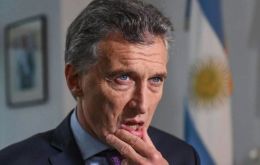
Tens of thousands of Argentines demonstrated on Tuesday in a partial strike that grounded airplanes and shut banks and other businesses to protest the economic policies of President Mauricio Macri.
-
Wednesday, May 1st 2019 - 02:40 UTC
Argentine pork to China, which is suffering from an African swine fever epidemic
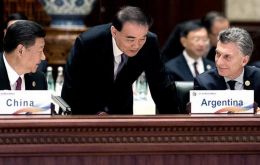
Argentina announced on Tuesday it had struck a deal with Chinese authorities that would allow it to begin exporting pork to the Asian giant from 25 of the country’s meat-packing plants.
-
Tuesday, April 30th 2019 - 09:59 UTC
Argentine Peso gains strength as IMF agrees to more central bank flexibility
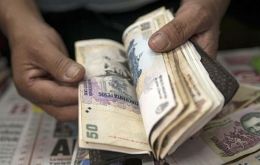
Argentina’s embattled peso gained strength on Monday after the central bank said it would ease limits on its foreign exchange market interventions, signaling its willingness to sell reserves in an effort to better control the volatility of the local currency. The peso began the session up 3.37% and closed 3.56% stronger at 44.37 per U.S. dollar.
-
Tuesday, April 30th 2019 - 09:55 UTC
Major strike and march announced for this Tuesday in Argentina, but unions remain divided
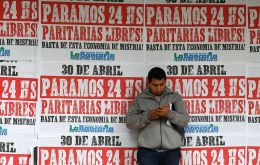
A national strike will halt much of shale-rich Argentina's economy on Tuesday amid growing investor concern that market-oriented president Mauricio Macri will lose a bid for re-election in October, swinging Argentina back toward state intervention.
-
Saturday, April 27th 2019 - 11:30 UTC
A week of volatility in Argentina ends with the Peso down 8.81%
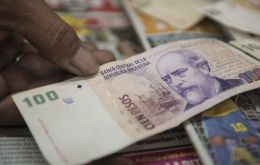
Argentina’s peso fell back on Friday afternoon to post a record low close, giving up earlier gains after a tumultuous week that saw the currency battered to its weakest ever level and local debt pummeled as anxious investors fled.
-
Friday, April 26th 2019 - 09:59 UTC
Second black day for Argentine markets and Peso; panic at a possible return of Cristina Fernandez and Kirchnerism
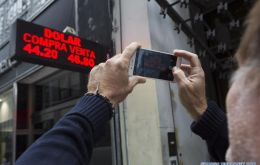
Argentine bonds and the country’s embattled peso currency fell for a second day on Thursday, cranking up the challenge facing President Mauricio Macri as his drop in the polls ahead of knife-edge elections later this year unnerves investors.
-
Thursday, April 25th 2019 - 21:48 UTC
Economic collapse in Argentina worsens in a volatile day: Macri blames uncertainty
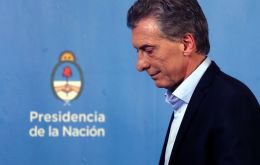
Argentina lived on Thursday another day in which the dollar rebounded and the country risk exceeded 1000 points. President Mauricio Macri criticized the “short-term” view of the markets and the Central Bank (BCRA) had to intervene by positioning the interest rate at 70% and diverting the futures market to contain the demand on the currency, preventing it from reaching the maximum accorded of 51.45 pesos.
-
Thursday, April 25th 2019 - 09:59 UTC
Argentine government admits that political uncertainty is behind the current collapse of economic indexes
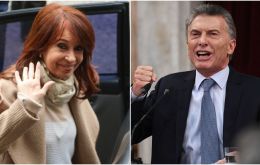
Argentine economy Minister Nicolás Dujovne stated that political uncertainty ahead of the upcoming presidential election this October is the main factor for increases in Argentina's country risk and instability on the exchange markets.
-
Tuesday, April 23rd 2019 - 09:18 UTC
Argentina managed a quarterly primary surplus during the first quarter
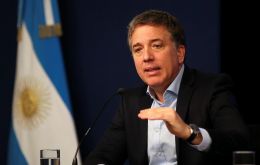
Argentina ran a primary fiscal deficit of 13.037 billion pesos (US$ 305.32 million) in March, the country’s Treasury minister Nicolás Dujovne said at a press conference on Monday, though posted a first-quarter surplus of 10.347 billion pesos.
